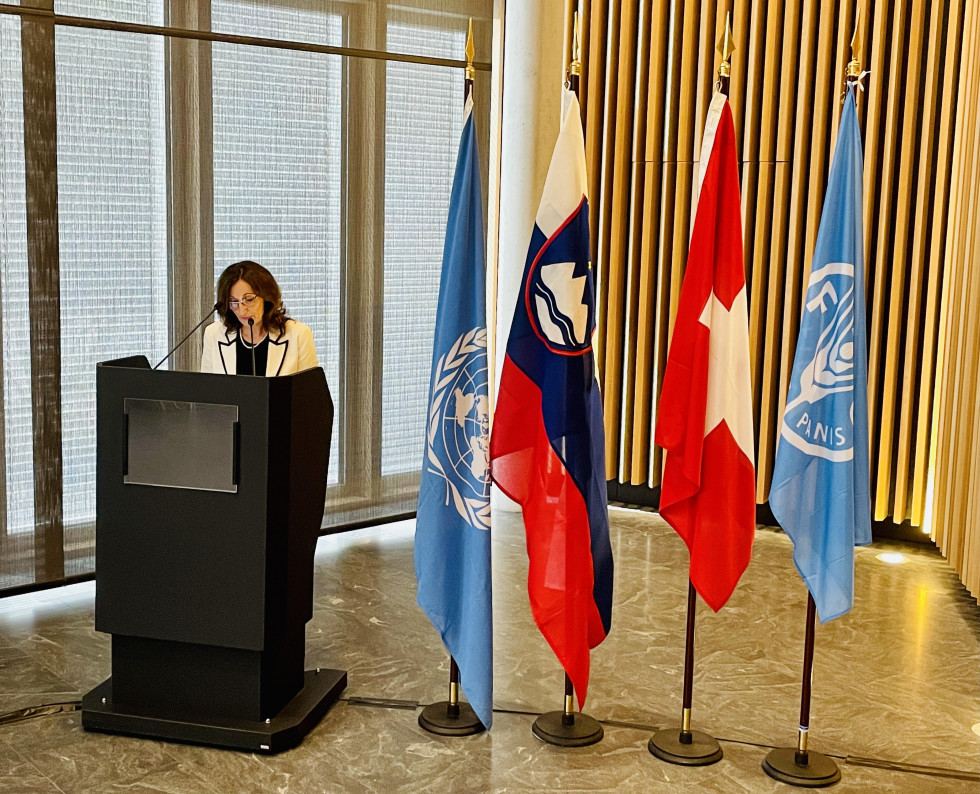World Bee Day in Geneva: celebrating the hard-working pollinators with "honey for hope" initiative
At the celebration of the World Bee Day at the Palais des Nations today, the Director-General of the United Nations Office at Geneva (UNOG), Tatiana Valovaya, emphasized the crucial importance of bees and other pollinators for sustainable agriculture, global food supply and hunger elimination. "Every third spoonful of food depends on pollination," she said.
One of the hardest-working beings on Earth, bees fly for 40,000 kilometers – the equivalent of flying around the globe – to make one kilogram of honey. The Permanent Representative of Switzerland, Jürg Lauber, recalled that Switzerland donated 10 beehives to the Palais des Nations in 2012, to celebrate the 10th anniversary of Switzerland joining the UN as a Member State. "Every year, Switzerland and UNOG share the results of these hard-working pollinators, Carnolian bees, who produce a unique product - honey for a sweeter world."
By pollinating crops, bees are an important source of jobs and farmers' income, in particular as regards small and family farms in developing countries. They also play an important role in preserving nature and biodiversity. Humans have been using honeybees for thousands of years and Slovenia decided to initiate procedures in the UN to declare World Bee Day back in 2017. "The initiative aims at drawing the attention of the international public to the importance of bee and pollinator conservation, highlight the importance of bees for agriculture, the environment and the entire humanity, and call for specific activities for their preservation," explained the Permanent Representative of Slovenia, Anita Pipan.
The benefits of beekeeping are well documented: keeping bees can support the economy and food production particularly against the backdrop of crises such as climate change, conflicts, economic downturns and pandemics.
Dominique Burgeon, Director of the Liaison Office in Geneva for the UN Food and Agriculture Organization (FAO), explained that "beekeeping is an excellent option for rural livelihood diversification. It helps alleviate poverty, protecting biodiversity and supporting food security. It also plays a critical role in a humanitarian context. For communities affected by the impact of climate change - including floods, droughts and reduced rainfall or of conflicts, beekeeping improves the overall quality of life." Mr. Burgeon highlighted that from Somalia to Yemen, FAO works closely with rural communities to unleash the potential of bees and beekeeping to increase resilience of livelihoods in crisis contexts. From providing beekeeping equipment and beehives to trainings and support to their honey business development, we are contributing to make a difference building throughout the various stages of the honey production cycle, he concluded.
Members of the international community in Geneva concluded the World Bee Day with a visit to the Parc de l'Ariana and a presentation by Mr. Pascal Crétard, president of the Beekepers' Federation of Geneva, who looks after the beehives at the Palais des Nations. In the evening the emblematic symbol of Geneva, Jet d'Eau, will be lit in yellow, to conclude the day long of celebrations of the hard-working pollinators.
About FAO, Slovenia and beekeeping in development cooperation
Most vulnerable rural farming households benefit from development cooperation projects that are providing an inclusive and reliable source of income and diversification employment opportunities through beekeeping farming. Given the role of Geneva as the world humanitarian hub, the celebration in Geneva highlighted also the key role of beekeepers in crisis contexts. From communities affected by the impact of climate change from floods to drought and reduced rainfall affected areas to regions facing protracted conflicts, beekeeping activities are improving people’s livelihoods. The World Bee Day at the Palais des Nations shed a light on two such examples – FAO's project called "Smallholder Agricultural Productivity Enhancement Programme (SAPEP) supporting beekeepers in Yemen as a contribution to restore agricultural livelihoods, enhance local food availability and mainstream the role of women and a project of Slovenia's Development Cooperation, called "Beekeeping as empowerment tool for people with disabilities from Bosnia and Herzegovina", executed by the ITF Enhancing Human Security.
About the World Bee Day in Geneva
The celebration of the World Bee Day 2022: "Honey for Hope" was organized jointly by the Permanent Mission of the Republic of Slovenia to the UN Office and other international organizations in Geneva, the Permanent Mission of Switzerland to the UN Office and other international organizations in Geneva, the FAO Liaison Office with the UN in Geneva, and the United Nations Office at Geneva.


